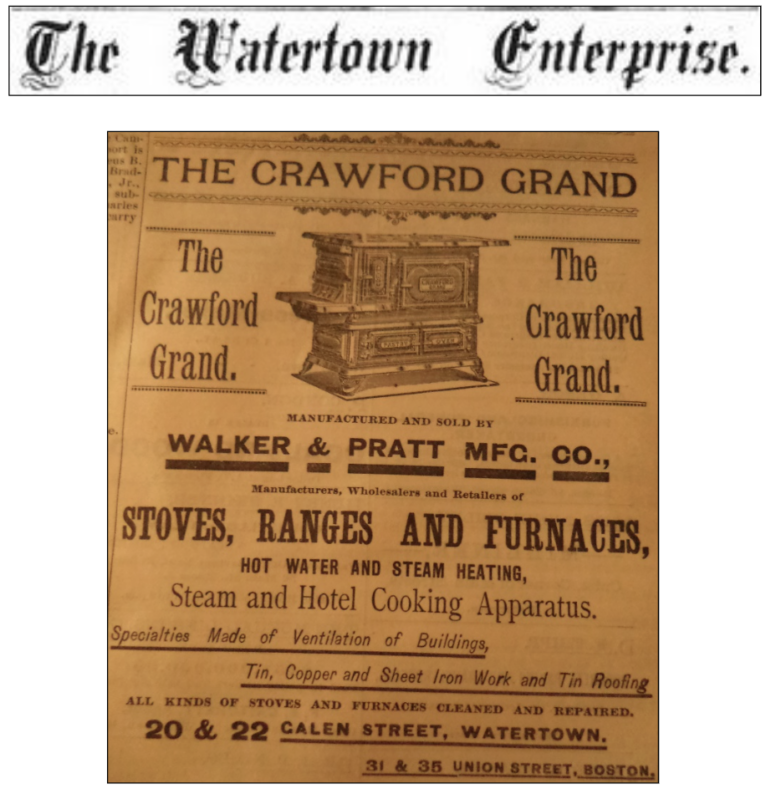
The following story is part of a series on local history provided by the Historical Society of Watertown. It was written by Historical Society of Watertown board member Mary Spiers. Mary served as our Recording and Corresponding Secretary for many years. Mary retired from the Board in January 2023 but is still a volunteer. She wrote this article for our April 2019 newsletter, “The Town Crier.”
It Happened in April
I thought it might be helpful to provide a background note in the opening paragraph to life in the U.S. in the 1890s. Even though Alexander Graham Bell patented the telephone in 1876, and our country had its first telephone exchange in Connecticut in 1877, the telephone was not fully in use until considerably later. According to “A Natural History of the Wooden Utility Pole”, by the California Public Utilities Commission, July 2017, it was not until “early 20th century did wooden poles begin to carry telephone and electric wires as well as telegraph lines.”
Historian Lucy Worsley who has hosted several PBS programs, including one on Victorian life, points out on her webpage that although electricity came into use in the 1880s, the home owner had to provide the generator. Different towns had different currents and manufacturers were not able to produce lighting fittings suited to each home. It was not until the National Grid came along in the 1930s that electrical power became common place. Ms. Worsely writes, “Not until the National Grid was created in the 1930s did electricity achieve ubiquity.”
Daily Life through American History in Primary Documents: The Civil War to WWI. Vol. 3 by Randall M. Miller, General Editor. Copyright 2012. “In the new century (20th) the forces of division would accelerate as more urban areas began to enjoy the comforts provided by electricity and indoor plumbing, which would not come in rural areas for another four decades.” P. 59
At the website, “AntiqueHomeStyle.com,” … it states: … “By 1910, house plans in almost all publications generally always showed a bathroom, much as we see them now. Summer cottages and early bungalows often went without, however.” …. “By 1920, the majority of new construction included indoor plumbing and at least one full bathroom … It wasn’t until the second quarter of the 20th century that bathrooms as an essential home component really took off with the market for plumbing and fixtures growing by more than 350% from 1929 to 1954.”
It Happened in April
The familiar refrain, “Happy Birthday to You,” entered our musical songbook in 1893. Singing and playing musical instruments enhanced our lives in a time before radio or television. It’s true that the 1890s gave us reasons to sing, but life at the end of the 19th century was still less than comfortable. We no longer cooked over an open hearth. Wood-burning or coal-fired cast iron stoves served as the kitchen range. Kerosene lamps, gas lamps or candles for the most part lit our daily lives, while the electric light and telephone would not see common usage until the early part of the 20th century. The three-piece bathroom set of tub, toilet and sink would not become a household feature until 1900 and much later in rural areas. Gas lamps lit the streets after dark, turned on by the lamp lighter. Over-sized stage coaches called “omnibuses” pulled by horses served as public transit, but happily electric street cars would soon appear to provide a smoother ride. Now, you may wonder about ordinary, everyday life in Watertown back then. Let us find out by looking through the past pages of our local newspapers to see what was blooming in the month of April …
Watertown Enterprise, April 5, 1888: “We regret to announce that A.T. Rice the well known carriage painter on Spring Street, has bought out D.W. Crocker’s shop in West Somerville and will soon remove to that place.” … “Mr. Seth Decker has entered the employ of the Fitchburg railroad company as brakeman on the Watertown branch.”… “The horse cars commenced running on the half-hour Monday, leaving the Square for Boston on the hour and half-hour.” … “The Sullivan Drug Store has been purchased by F.H. Martin, formerly with Theodore Metcalf and Co. of Boston. Mr. Martin is a graduate of the Massachusetts College of Pharmacy and is not only a thorough apothecary, but a chemist.”
Watertown Enterprise, April 25, 1889: “Last Monday afternoon Mr. Horatio Butters, employed at the paper mill, caught the fingers of his left hand in a calendar machine and crushed them severely. He visited the office of Dr. Emerson, who said although the fingers were jammed very badly, he hoped by careful treatment to be able to save them.”
Watertown Enterprise, April 4, 1890: “The Trustees of the Watertown Savings Bank held their regular meeting last Tuesday night and declared a dividend of 2%.”… Ad: “Do you want a pair? You will find a trappy pair of handsome bays at Potter’s stables that will suit you.” …. “The number of tramps who apply at the police station for lodgings is on the increase. Tuesday night seven were given lodgings and Wednesday night four of them passed the night in the same place.”… “It is expected that on Friday of this week the House post office committee will favorably report a bill to extend the free delivery system to all towns having a population of not less than 5,000 people within their corporate limits according to the last general state or national census, or whose post office receipts for the last fiscal year provided not less than $7,000. Under the provisions of this bill, Watertown would be entitled to free delivery.” … “Joseph Russo will soon add a soda fountain to his fruit store.” … “Although the carpenters of Watertown have taken no definite action, we are told that they heartily endorse the eight-hour movement.”
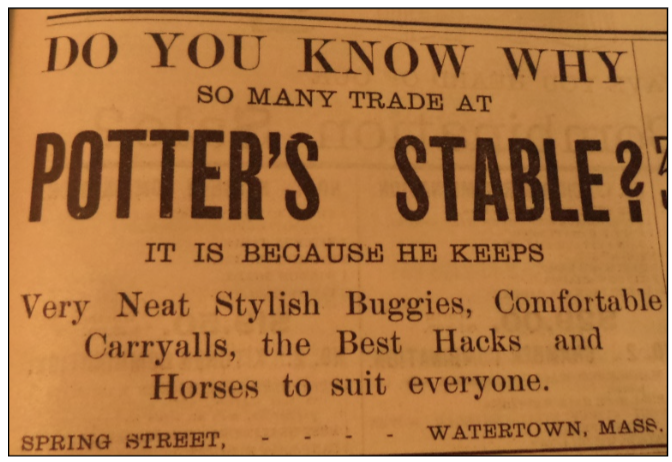
Watertown Enterprise, April 18, 1890: “Many people have asked why the watering cart has not been around. We have been told that just as soon as it comes out of the repair and paint shop, it will begin to lay the dust. In the meantime, the old cart will supply its place as best it can.” … Mr. P.J. Kelley, who recently made a trip to Canada and returned with a number of fine horses, has sold them all … Mr. Kelley will again start for the Dominion tomorrow or next day, and will return in two or three weeks with a larger and even finer lot, if that were possible, than the last. Anyone in need of a first class animal should await his return, if he should not wish to engage Mr. Kelley’s service before he starts.” … “Mr. Fred E. Critchett has been appointed Justice of the Peace and has received his commission.” … “Allen’s Express is now running another train from Boston at 4:15 p.m. It will be a great accommodation for many of the patrons of the railroad express.”
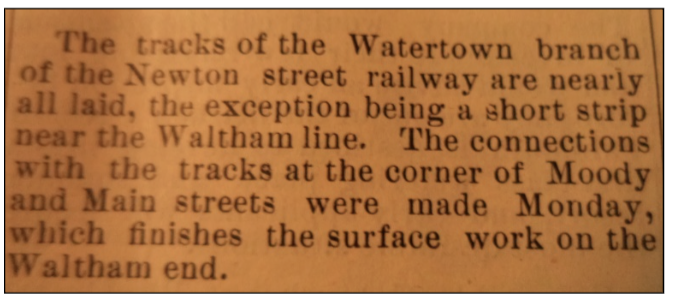
Under the headline: Historical Society of Watertown: “The meeting of the Historical Society was the largest except the annual banquet, and one of the most interesting meetings yet held. The following program was carried out:
• Description of Norumbega Tower — Mrs. Emma A. Wright
• The Indians in Watertown — Rev. Edward Rand
• Early Locations of First Church — Dr. B.F. Davenport
• Early Traditions — Joshua Coolidge, Esq.
• The “South Side” — Charles S. Ensign, Esq.
• Historical Sketch of the Free Masons of Watertown — Mr. Alberto F. Haynes
Mr. Jesse Fewkes who lives on the Newton line, exhibited and described scores of Indian implements of various form and purpose which he had dug chiefly from Cassidy’s sandbanks.” (The Town Crier Editor’s Note: John Cassidy’s property was very large and fronted the Charles River off North Beacon St where the Watertown Yacht Club is currently located.)
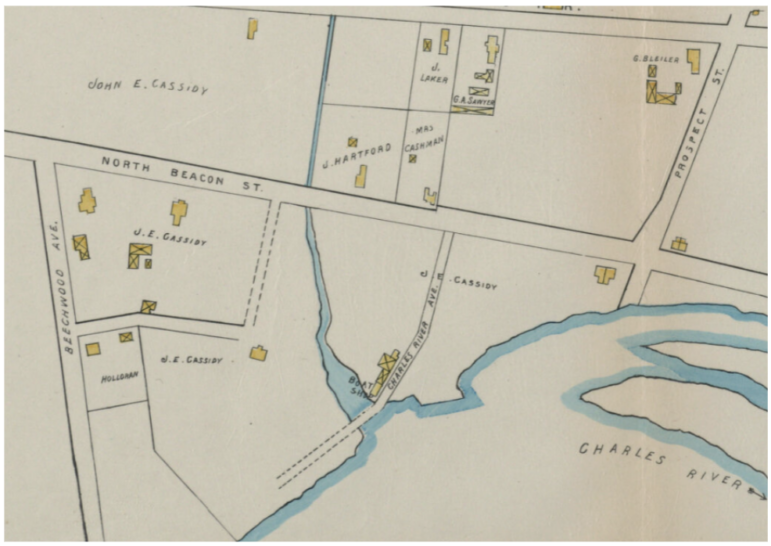
Watertown Enterprise, April 25, 1890: “We overheard one of the pupils of the Francis School make the following speech: ‘We’ve got the dandy teacher, her name is Miss Bullard. She comes from Hyde Park; goes home every night and gets her meals at Mrs. French’s. She buys us bats and balls, and if we break a window she pays for it out of her own pocket and don’t say nothin’ about it. She’s a dandy, she is.’ The speech is not grammatical, but it shows what the boys in Miss Bullard’s school think of their teacher.”
Watertown Enterprise, April 3, 1891: “Our readers are warned against the $2 counterfeit bills which are being largely circulated. There is no need of looking out for the genuine $2 bills as they will look out for themselves.” … “The selectmen have appointed Messrs. Samuel Stearns, Thomas Wicks and Chief of Police Parker, fence viewers.”
Watertown Enterprise, April 17, 1891: “Summer residents of Marblehead Neck and Beverly are rejoicing in the fact that the steamer “Watertown” will this season make daily trips to Boston, leaving the above places at about 8 a.m. and down from Boston at 4 p.m. In good weather the sail taking but one and one-half hours … “A young boy took the first swim of the season in the Charles last Tuesday. He was watched by an admiring crowd of boys who hardly had the courage to brave the cold water.”
Watertown Enterprise, April 7, 1893: (Subscription price is $1.50 per year), “Quite a crowd collected in Mr. John E. Casssidy’s shipyard last Monday to witness the sale of the hull of the partially burned steamer “Watertown.” L.H. Burnham the coal dealer, was the purchaser. He will repair the steamer and use in his business.” … “As soon as the electric line is completed and the tracks laid to Watertown Square, Main Street is to be repaired and raised.” … Under the headline “Bound to come: “
- New town hall
- Steam Roller for use on the highways
- Better roads
- At least $5,000 a year for macadamizing streets
- *Electric road to Waltham
- Electric cars to Boston
- *Extension of sewer to Bemis
- Abatement of Charles River nuisance
- Development of the Arsenal
- Dredging of the Charles
- *A double track on the Watertown branch
- Removal of the Cattle Yards
- Building boom at the East End
- Building boom at the West End
- More first class business blocks
Items marked (*) are already on the road to accomplishment.
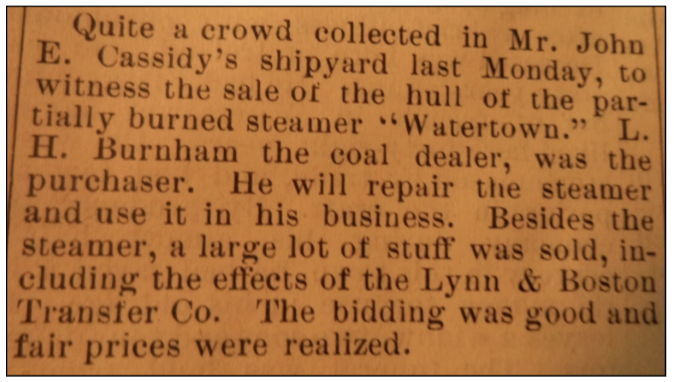
Watertown Enterprise, April 14, 1893: Under the headline “Our School Teachers:” “Your correspondent of last week stated that the average number of scholars per teacher in Watertown is 25; and that in Newton 32.”
Watertown Enterprise, April 21, 1893:
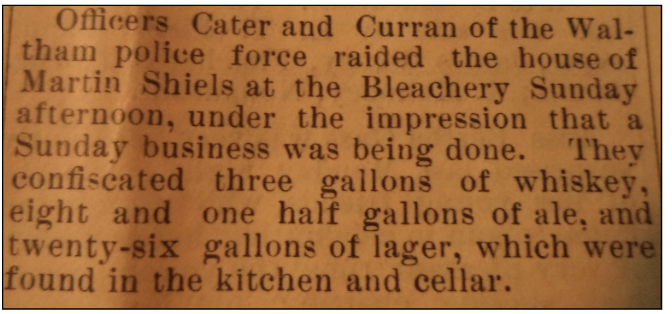
“Officers Cater and Curran of the Waltham police force raided the house of Martin Shiels at the Bleachery Sunday afternoon, under the impression that a Sunday business was being done. They confiscated three gallons of whiskey, eight and one-half gallons of ale, and 26 gallons of lager which were found in the kitchen and cellar.” … “Mrs. Helen G. Rice, national superintendent of juvenile temperance work will speak to the Loyal Temperance Legion next Monday at the usual hour … Mrs. Rice will assist us in more thoroughly organizing and informing our plans for a systematic course of temperance instruction. As each pupil finishes the required course in the junior division, he will be promoted to the higher course at the end of which he will receive the national diploma. Much work will be done, and the seniors should be ready to teach in the junior division as combined effort is necessary for success.”
There you have it, a glimpse into daily life in Watertown generations ago. The Arsenal was developed; the Cattle Yards are gone; we have free mail delivery. April is here and again hope is in the air.
Beautifully written and researched-I thoroughly enjoyed reading this piece of history.
Seeing how Crawford Stoves is prominent on ths posting you should mention that driving Past 22 Galen Street (toward the Pike Rotary) you can see a a very prominent ad – ghost on the wall for Crawford.